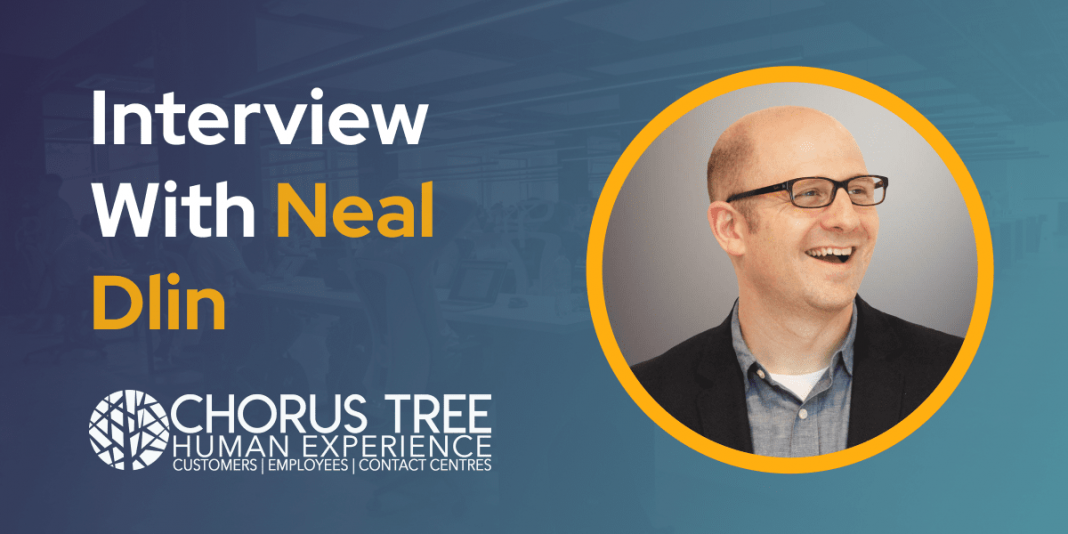Hi Neal, tell us about yourself and share some background about Chorus Tree.
Aside from being a full grown man-child, I am an idealist and a humanist. I believe that we create ripples in our actions that expand and transforms. We can create cause that has effects we likely never intended and often can’t imagine. When we put out kindness, compassion and treat others with dignity, it expands outwardly and when we treat others poorly and without respect, it does the same. This brings with it a tremendous responsibility on both corporations and individuals. Additionally, all people, whether in our personal lives or our customers or our employees, all people have the same basic needs that when acted upon, creates fierce loyalty and advocacy. So even in a self-serving way, there is an impetus to treat others well.
I started my career in contact centers on the phones and worked my way through and up all aspects of contact center operations before leading global service strategy. From there the scope of my work expanded into the broad customer experience, working with other executives to understand the full customer journey. The natural evolution of this was to expand into the employee experience both because of the similarities but also the critical interdependencies. You can create decent customer experiences following some best practice methods but you cannot deliver an exceptional customer experience without delivering an exceptional employee experience.
I launched a consulting firm in 2008 which was rebranded as Chorus Tree Consulting in 2018. Although I still feel I need to earn the recognition, I am often regarded as a thought leader in the areas of customer and employee experience as well as an industry authority on customer service/contact centers including being named to ICMI’s thought leader list two years in a row. I have been doing this work, which I love, for 25 years now. I have worked across multiple industries, leading brands, and digital start-ups, with expertise in service strategy development, employee and customer journeys, contact center operations, and business transformation.
I believe wholeheartedly in servant leadership and maintain a futurist perspective in all I do. I am also a very lucky husband and proud father of three children. Additionally, I also founded a charitable project in 2011 called Unsung Heroes Productions (UHP). UHP produces musical theatre fundraisers for Cancer, Mental Health and Poverty which has donated over $500,000 to date for these causes. I even sing in the shows much to the dismay of our audiences. You can learn more at www.unsungheroesproductions.com.
About Chorus Tree: Chorus Tree – Human Experience (Customer and Employee), understands the critical interdependencies between employee and customer experiences and is uniquely equipped to help clients in a holistic way. Our team is comprised of a balance between expert award-winning hands-on practitioners, data and analytics experts, and organizational psychology expertise. Our main focuses are on CX, EX, and Contact Centres.
How much has the consumer sentiments changed in the contact center space during 2020 and how is 2021 going to look like?
Consumer sentiments have been continuously evolving quite rapidly for years now, not just due to the pandemic. The rise in automation, self-serve, crowdsourcing and elimination of common contact drivers has dramatically shifted the interactions contact centers now handle. Where employees once handled the same simple issues in volume with an almost factory-like set of processes and procedures, now the interactions are varied, nuanced, urgent, and emotionally charged.
This has given rise to a much different agent profile and the need to change how we think about managing a contact center operation. Add to that, digital startups have rethought the customer experience, often writing new processes for contact centers from scratch in the process with a very human-centered approach. This has set a new bar for customer expectations who can’t understand why their bank or cell phone provider can’t deliver the same experience. Prior to this, any new contact center was almost a carbon copy of another center either based on the leader who was hired or conferences, courses, and books that leaders were sent to attend, take, read. For about three decades, the industry has perpetuated a set of best practices that have stayed practically static while customers’ needs have changed so drastically.
What 2020 saw was that as companies moved their agents into a work from a home model, even some of the great ones who had adapted to the new set of customer needs, many did not have the design aspect of their operation locked down. In the office, they had leadership by proximity but at home, they needed to have it by design and many were scrambling.
2021 will have a few key themes.
1 – It’s the year to rethink your contact center model in its entirety. Is it serving your CX goals and supporting your brand or is it in conflict with them?
2 – How well have you designed the employee experience with the care that you may have designed your customer experiences? EX done well is often the missing ingredient to delivering amazing CX.
3 – How can you map out both, intertwined into well documents policies and procedures that can live on-premise or in a work from model?
In your POV, what are the most important KPIs you use to measure customer experience benchmarks?
This is a great question. So many companies look for a silver bullet. Ultimately, the outcome that really matters is how sustainable your business is. You can have high profits and low experience but inevitably you will not be a sustainable business. All the other KPIs are tools to get there and in that regard, many organizations focus either on the wrong metrics or an incomplete set.
Traditional go-to’s like NPS, CSAT, Customer Effort, Attrition, Purchase behavior, etc are still good. However, companies need to separate metrics into buckets they can use to drive change. Some metrics are outcomes, some are diagnostics and some are evidentiary. Some can fall into more than one bucket.
Understanding what buckets they are in changes the actions you might take. For example, NPS is a great outcome metric but on its own, can tell you very little about what actions to take. Additionally, NPS is often not measured across a true representative sample set inclusive of all customer segments and across customer journey interaction points. So it can be misleading (e.g. measuring the NPS in a complaint center only may cause a disproportionate sense of urgency).
A company needs to look across its VoC and VoE ecosystem and understand the diagnostic measures that contribute to key outcomes that are built into a continuous improvement process with stakeholders across the organization. Lastly, the key outcomes need to be shared across the organization. Every role, even those many steps downstream, can impact the customer experience and so everyone needs to be held to those KPIs in some meaningful way.
How much has the role of the CX Executive changed in the social distancing era – what role digital transformation has in this crisis?
Digital transformation has expectedly been accelerated. There are IT and UX leaders all over the world who feel like it’s their birthday as projects they have been trying to get approved for years have all been pushed to the forefront. A CX executive today is more than a single role but needs to be the most weighted aspect to all executive roles. This is not just a factor of social distancing but for all the reasons I mention above However with social distancing and the inevitable fallout of increased work from home, all leaders need to look more closely at how they design and execute employee journeys.
In the past, many relied on leadership by proximity, often lacking in planning and intent and instead of using intuition and presence to lead their organizations. Now, the outcomes great leaders achieved in the past through proximity, need to be woven into new approaches within an employee journey.
Customer experience at Chorus Tree
How is Chorus Tree transforming the customer experience landscape?
To start, we certainly hope we are. We work with our clients in several capacities. We conduct CX, EX, and contact center assessments and help them roadmap not just to best practices but to next practices. We want them to lead, not just compete. We also engage in consultative engagements on the planning and implementation of initiatives in these same three areas. Some of our clients leverage us as an advisory service or “phone a friend” while others leverage us as executive coaches.
What was the biggest lesson you learned in 2020?
Wear a mask. But from the perspective of CX, we learned so much. Digital acceleration may have been sparked out of the necessity of the pandemic but has also accelerated case study data that substantiates the work. This means, speed of transformation will only quicken, long afterlife more closely resembles “normal”. Another lesson was that many organizations do not have concrete employee journeys or well-documented leadership practices. Leaders are still struggling to manage remote workforces with the efficacy they did in person. We also learned that customer grace is short-lived.
Customers will allow disruptions to normal service levels in a crisis but expect a fairly speedy recovery. Companies who used to dust off their disaster recovery plans every few years (that were largely only focused on Keeping the Lights On and not the rounded aspects of people, process, technology over a long period of disruption) need to take these learnings and build a far more robust set of plans that are tested several times each year.
2020 was the year of webinars and online events, what was your favorite one?
I am biased as I am a member of the Advisory Council for the Greater Toronto Contact Center Association. Last year they pivoted like many others, to not only transform their physical events (annual conference, awards gala, women in leadership, and more) into virtual events, but they actually launched a weekly series of Covid focused webinars to help the community share learnings and adjust quickly. Best of all, they made all of their events either completely free or asked for a donation to local charities. It was inspiring and selfless.






